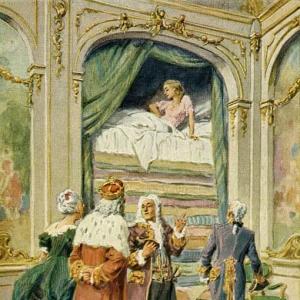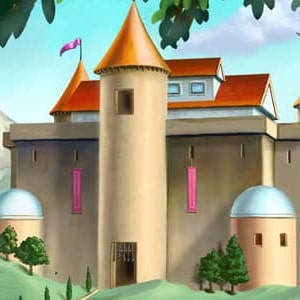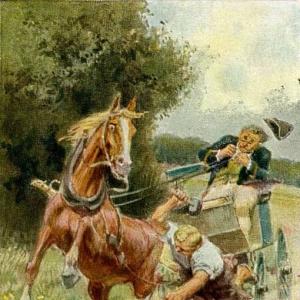Reading time: 17 min
There was once a young fellow who had learnt the trade of locksmith, and told his father he would now go out into the world and seek his fortune. „Very well,“ said the father, „I am quite content with that,“ and gave him some money for his journey. So he travelled about and looked for work. After a time he resolved not to follow the trade of locksmith any more, for he no longer liked it, but he took a fancy for hunting. Then there met him in his rambles a huntsman dressed in green, who asked whence he came and whither he was going? The youth said he was a locksmith’s apprentice, but that the trade no longer pleased him, and he had a liking for huntsmanship, would he teach it to him? „Oh, yes,“ said the huntsman, „if thou wilt go with me.“ Then the young fellow went with him, bound himself to him for some years, and learnt the art of hunting. After this he wished to try his luck elsewhere, and the huntsman gave him nothing in the way of payment but an air-gun, which had, however, this property, that it hit its mark without fail whenever he shot with it. Then he set out and found himself in a very large forest, which he could not get to the end of in one day. When evening came he seated himself in a high tree in order to escape from the wild beasts. Towards midnight, it seemed to him as if a tiny little light glimmered in the distance. Then he looked down through the branches towards it, and kept well in his mind where it was. But in the first place he took off his hat and threw it down in the direction of the light, so that he might go to the hat as a mark when he had descended. Then he got down and went to his hat, put it on again and went straight forwards. The farther he went, the larger the light grew, and when he got close to it he saw that it was an enormous fire, and that three giants were sitting by it, who had an ox on the spit, and were roasting it. Presently one of them said, „I must just taste if the meat will soon be fit to eat,“ and pulled a piece off, and was about to put it in his mouth when the huntsman shot it out of his hand. „Well, really,“ said the giant, „if the wind has not blown the bit out of my hand!“ and helped himself to another. But when he was just about to bite into it, the huntsman again shot it away from him. On this the giant gave the one who was sitting next him a box on the ear, and cried angrily, Why art thou snatching my piece away from me?“ – „I have not snatched it away,“ said the other, „a sharpshooter must have shot it away from thee.“ The giant took another piece, but could not, however, keep it in his hand, for the huntsman shot it out. Then the giant said, „That must be a good shot to shoot the bit out of one’s very mouth, such an one would be useful to us.“ And he cried aloud, „Come here, thou sharpshooter, seat thyself at the fire beside us and eat thy fill, we will not hurt thee; but if thou wilt not come, and we have to bring thee by force, thou art a lost man!“ On this the youth went up to them and told them he was a skilled huntsman, and that whatever he aimed at with his gun, he was certain to hit. Then they said if he would go with them he should be well treated, and they told him that outside the forest there was a great lake, behind which stood a tower, and in the tower was imprisoned a lovely princess, whom they wished very much to carry off. „Yes,“ said he, „I will soon get her for you.“ Then they added, „But there is still something else, there is a tiny little dog, which begins to bark directly any one goes near, and as soon as it barks every one in the royal palace wakens up, and for this reason we cannot get there; canst thou undertake to shoot it dead?“ – „Yes,“ said he, „that will be a little bit of fun for me.“ After this he got into a boat and rowed over the lake, and as soon as he landed, the little dog came running out, and was about to bark, but the huntsman took his air-gun and shot it dead. When the giants saw that, they rejoiced, and thought they already had the King’s daughter safe, but the huntsman wished first to see how matters stood, and told them that they must stay outside until he called them. Then he went into the castle, and all was perfectly quiet within, and every one was asleep. When he opened the door of the first room, a sword was hanging on the wall which was made of pure silver, and there was a golden star on it, and the name of the King, and on a table near it lay a sealed letter which he broke open, and inside it was written that whosoever had the sword could kill everything which opposed him. So he took the sword from the wall, hung it at his side and went onwards: then he entered the room where the King’s daughter was lying sleeping, and she was so beautiful that he stood still and, holding his breath, looked at her. He thought to himself, „How can I give an innocent maiden into the power of the wild giants, who have evil in their minds?“ He looked about further, and under the bed stood a pair of slippers, on the right one was her father’s name with a star, and on the left her own name with a star. She wore also a great neck-kerchief of silk embroidered with gold, and on the right side was her father’s name, and on the left her own, all in golden letters. Then the huntsman took a pair of scissors and cut the right corner off, and put it in his knapsack, and then he also took the right slipper with the King’s name, and thrust that in. Now the maiden still lay sleeping, and she was quite sewn into her night-dress, and he cut a morsel from this also, and thrust it in with the rest, but he did all without touching her. Then he went forth and left her lying asleep undisturbed, and when he came to the gate again, the giants were still standing outside waiting for him, and expecting that he was bringing the princess. But he cried to them that they were to come in, for the maiden was already in their power, that he could not open the gate to them, but there was a hole through which they must creep. Then the first approached, and the huntsman wound the giant’s hair round his hand, pulled the head in, and cut it off at one stroke with his sword, and then drew the rest of him in. He called to the second and cut his head off likewise, and then he killed the third also, and he was well pleased that he had freed the beautiful maiden from her enemies, and he cut out their tongues and put them in his knapsack. Then thought he, „I will go home to my father and let him see what I have already done, and afterwards I will travel about the world. The luck which God is pleased to grant me will easily find me.“
But when the King in the castle awoke, he saw the three giants lying there dead. So he went into the sleeping-room of his daughter, awoke her, and asked who could have killed the giants? Then said she, „Dear father, I know not, I have been asleep.“ But when she arose and would have put on her slippers, the right one was gone, and when she looked at her neck-kerchief it was cut, and the right corner was missing, and when she looked at her night-dress a piece was cut out of it. The King summoned his whole court together, soldiers and every one else who was there, and asked who had set his daughter at liberty, and killed the giants? Now it happened that he had a captain, who was one-eyed and a hideous man, and he said that he had done it. Then the old King said that as he had accomplished this, he should marry his daughter. But the maiden said, „Rather than marry him, dear father, I will go away into the world as far as my legs can carry me.“ But the King said that if she would not marry him she should take off her royal garments and wear peasant’s clothing, and go forth, and that she should go to a potter, and begin a trade in earthen vessels. So she put off her royal apparel, and went to a potter and borrowed crockery enough for a stall, and she promised him also that if she had sold it by the evening, she would pay for it. Then the King said she was to seat herself in a corner with it and sell it, and he arranged with some peasants to drive over it with their carts, so that everything should be broken into a thousand pieces. When therefore the King’s daughter had placed her stall in the street, by came the carts, and broke all she had into tiny fragments. She began to weep and said, „Alas, how shall I ever pay for the pots now?“ The King had, however, wished by this to force her to marry the captain; but instead of that, she again went to the potter, and asked him if he would lend to her once more. He said, „No,“ she must first pay for the things she had already had. Then she went to her father and cried and lamented, and said she would go forth into the world. Then said he, „I will have a little hut built for thee in the forest outside, and in it thou shalt stay all thy life long and cook for every one, but thou shalt take no money for it.“ When the hut was ready, a sign was hung on the door whereon was written, „To-day given, to-morrow sold.“ There she remained a long time, and it was rumored about the world that a maiden was there who cooked without asking for payment, and that this was set forth on a sign outside her door. The huntsman heard it likewise, and thought to himself, „That would suit thee. Thou art poor, and hast no money.“ So he took his air-gun and his knapsack, wherein all the things which he had formerly carried away with him from the castle as tokens of his truthfulness were still lying, and went into the forest, and found the hut with the sign, „To-day given, to-morrow sold.“ He had put on the sword with which he had cut off the heads of the three giants, and thus entered the hut, and ordered something to eat to be given to him. He was charmed with the beautiful maiden, who was indeed as lovely as any picture. She asked him whence he came and whither he was going, and he said, „I am roaming about the world.“ Then she asked him where he had got the sword, for that truly her father’s name was on it. He asked her if she were the King’s daughter. „Yes,“ answered she. „With this sword,“ said he, „did I cut off the heads of three giants.“ And he took their tongues out of his knapsack in proof. Then he also showed her the slipper, and the corner of the neck-kerchief, and the bit of the night-dress. Hereupon she was overjoyed, and said that he was the one who had delivered her. On this they went together tothe old King, and fetched him to the hut, and she led him into her room, and told him that the huntsman was the man who had really set her free from the giants. And when the aged King saw all the proofs of this, he could no longer doubt, and said that he was very glad he knew how everything had happened, and that the huntsman should have her to wife, on which the maiden was glad at heart. Then she dressed the huntsman as if he were a foreign lord, and the King ordered a feast to be prepared. When they went to table, the captain sat on the left side of the King’s daughter, but the huntsman was on the right, and the captain thought he was a foreign lord who had come on a visit. When they had eaten and drunk, the old King said to the captain that he would set before him something which he must guess. „Supposing any one said that he had killed the three giants and he were asked where the giants‘ tongues were, and he were forced to go and look, and there were none in their heads, how could that happen?“ The captain said, „Then they cannot have had any.“ – „Not so,“ said the King. „Every animal has a tongue,“ and then he likewise asked what any one would deserve who made such an answer? The captain replied, „He ought to be torn in pieces.“ Then the King said he had pronounced his own sentence, and the captain was put in prison and then torn in four pieces; but the King’s daughter was married to the huntsman. After this he brought his father and mother, and they lived with their son in happiness, and after the death of the old King he received the kingdom.
 Learn languages. Double-tap on a word.Learn languages in context with Childstories.org and Deepl.com.
Learn languages. Double-tap on a word.Learn languages in context with Childstories.org and Deepl.com.Backgrounds
Interpretations
Adaptions
Summary
Linguistics
„The Skillful Huntsman“ is a German fairy tale collected by the Brothers Grimm, who were well-known for their compilation of traditional European folklore. The tale is included in their collection titled „Grimm’s Fairy Tales,“ also known as „Children’s and Household Tales“ (Kinder- und Hausmärchen), first published in 1812.
The Brothers Grimm, Jacob (1785–1863) and Wilhelm (1786–1859), were German scholars, linguists, and cultural researchers who played a crucial role in the development and popularization of German folklore. Their collection of tales has become an essential part of the Western literary tradition, and many stories have been adapted into various forms of art, including theater, film, and animation.
„The Skillful Huntsman“ follows a young man who leaves his locksmith trade to pursue his passion for hunting. Throughout his journey, he encounters challenges and adversaries, including giants and a deceitful captain, ultimately triumphing through his honesty, skill, and integrity. The tale encompasses themes of self-discovery, the triumph of good over evil, the transformative power of love, and the consequences of deceit.
As with many fairy tales, „The Skillful Huntsman“ contains moral lessons and explores universal human experiences, making it a timeless story that continues to resonate with readers and audiences today.
„The Skillful Huntsman“ is a classic fairy tale that can be interpreted in several ways. Here are some possible interpretations:
Triumph of good over evil: The story illustrates the classic theme of good prevailing over evil, as seen in the huntsman’s defeat of the giants and the exposure of the deceitful captain. The huntsman is rewarded for his courage, skill, and good intentions, while the villains face punishment for their actions.
The importance of self-discovery and personal growth: The protagonist’s journey from being a locksmith apprentice to a skilled huntsman highlights the importance of self-discovery and personal growth. The young man’s decision to follow his passion leads him on an incredible adventure where he ultimately becomes a hero and finds love and happiness.
The power of honesty and integrity: The huntsman’s actions are driven by honesty and integrity. His refusal to deceive the princess and the king ultimately leads to his success and happiness. This theme emphasizes the importance of staying true to one’s values, even in the face of temptation or adversity.
The transformative power of love: The love story between the huntsman and the princess serves as a central theme in the fairy tale. Their love for each other not only leads to their union but also transforms their lives. The princess is saved from a life of servitude and misery, and the huntsman becomes a king, demonstrating the power of love to bring about positive change.
The consequences of deceit: The deceitful captain’s false claims ultimately lead to his downfall. This aspect of the story serves as a cautionary tale about the dangers of dishonesty and emphasizes the importance of being truthful and taking responsibility for one’s actions.
„The Skillful Huntsman“ from Brothers Grimm has inspired several adaptations and retellings over the years. Here are some notable ones:
„The Hunting of the Snark“ by Lewis Carroll: This poem, published in 1876, is a satirical take on the hunting genre and features a crew of eccentric characters searching for the elusive Snark. The poem draws on the themes of hunting and exploration found in „The Skillful Huntsman.“
„The Hunter’s Moon“ by O. Henry: This short story, published in 1902, tells the story of a young couple who go hunting in the woods on their honeymoon. The story is a romanticized version of the huntsman and princess plot from „The Skillful Huntsman.“
„The Magic Horn“ by Emily Rodda: This children’s book, published in 2000, retells the story of „The Skillful Huntsman“ with a few changes to the plot and characters. In this version, the huntsman is a young boy named Leif who is given a magic horn by a mysterious stranger. The story emphasizes the importance of friendship and loyalty.
„The Last Unicorn“ by Peter S. Beagle: This novel, published in 1968, features a unicorn who sets out on a quest to discover why she is the last of her kind. Along the way, she encounters a cast of characters, including a magician and a huntsman, who are searching for their own versions of the unicorn. The novel draws on the themes of magic and myth found in „The Skillful Huntsman.“
„The Hunter’s Promise“ by Cheryl Matthynssens: This retelling of „The Skillful Huntsman,“ published in 2014, is set in the African savannah and features a Maasai warrior named Kito who is tasked with hunting a rogue lion. The story emphasizes the importance of respecting nature and the balance between predator and prey.
„The Skillful Huntsman“ by the Brothers Grimm tells the story of a young locksmith apprentice who decides to become a huntsman. He learns the art of hunting from a man dressed in green, who gives him an air-gun that never misses its mark. He ventures into a large forest and one night, he comes across three giants roasting an ox. He outwits them by shooting the food out of their hands with his air-gun. The giants eventually invite him to join them, and they tell him about a beautiful princess locked in a tower, guarded by a little barking dog.
The huntsman kills the dog with his air-gun, thus ensuring that the giants can’t get to the princess. However, he decides to save the princess from the giants, as he does not want to leave her at their mercy. He cuts off the giants‘ heads and collects their tongues as proof of his deed. Before leaving, he takes some items from the princess’s room as evidence of his truthfulness.
The princess’s father, the King, discovers the dead giants and wants to know who killed them. A one-eyed captain falsely claims to have done it, hoping to marry the princess. The princess would rather leave the kingdom than marry the captain, but the King forces her to live in a small hut in the forest, where she cooks without payment.
The huntsman hears of the princess’s situation and visits her, showing her the items he had taken and the giants‘ tongues. Realizing he is her true savior, the princess brings the huntsman to her father, who then recognizes the truth. The deceitful captain is sentenced to a gruesome death, and the huntsman marries the princess. Eventually, he becomes king and lives happily with his wife and parents.
„The Skillful Huntsman“ is a rich and engaging fairy tale collected by the Brothers Grimm. The story provides ample material for linguistic analysis focusing on its narrative techniques, character development, and thematic elements typical of fairy tales.
Structure and Narrative Techniques
Linear Progression: The story follows a linear narrative, a common structure in fairy tales. The protagonist sets off on a journey, encounters challenges, overcomes them, and eventually achieves a happy ending. This structure reinforces the concept of a moral journey or quest, typical in folklore.
Repetition: The use of repetition is evident in the actions of the protagonist and the dialogue, serving to emphasize key plot points. For example, the huntsman’s impressive shooting skills are demonstrated multiple times, reinforcing his prowess and the magical element of his air-gun.
Dialogue: The dialogue is straightforward and functional, often moving the plot forward or illustrating character relationships. It frequently involves a question-and-answer format that introduces new complications or resolutions, such as the king’s challenge to the captain.
Language and Style
Formal Register: The language used is formal and somewhat archaic, reflecting the tale’s origins and the oral tradition from which such stories typically come. Phrases like „thou wilt“ and „whence he came“ lend an old-fashioned tone.
Descriptive Imagery: Vivid descriptions are used to paint scenes and characters. The depiction of the giants, the castle, and the princess’s attire adds a visual richness that helps readers imagine the narrative vividly.
Symbolism: Fairy tales often rely on symbolic elements. In this story, items like the air-gun, the sword, and the pieces of the princess’s clothing serve as tokens of truth and proof of the protagonist’s deeds. These symbols are crucial in resolving the story and establishing justice.
Themes and Motifs
Quest for Identity and Fortune: The tale follows a classic hero’s journey where a young man sets out to find his place in the world. Initially a locksmith, he transitions into a huntsman, suggesting a quest for personal identity and fulfillment.
Good vs. Evil: This fundamental theme is evident in the protagonist’s battle against the giants, representing evil. The young huntsman’s cleverness and moral integrity triumph over brute strength and malice.
Justice and Truth: Central to the story is the concept of truth and justice. The huntsman’s integrity and proofs of his actions ultimately lead to the reward of marrying the princess. The false claim of the captain leads to his punishment, underpinning the moral that truth prevails.
Character Analysis
The Huntsman: The protagonist embodies the archetype of a clever and skillful hero who uses intelligence and bravery to overcome adversities. His development from an apprentice locksmith to a skillful huntsman highlights themes of personal growth and self-discovery.
The Princess: Initially passive in her role as a damsel in distress, the princess’s character gains agency by refusing to marry the deceitful captain and valuing the truth, aligning herself with the moral core of the story.
The Giants and the Captain: These characters serve as antagonists, presenting different forms of villainy. The giants symbolize a straightforward, external threat, while the captain’s deceit represents internal corruption and falsehood.
„The Skillful Huntsman“ is a classic fairy tale that leverages traditional storytelling techniques, rich symbolism, and archetypal characters to convey themes of truth, justice, and the hero’s journey. Through its timeless narrative, it reflects the moral values and cultural motifs inherent in folktales passed down through generations.
Information for scientific analysis
Fairy tale statistics | Value |
|---|---|
| Number | KHM 111 |
| Aarne-Thompson-Uther-Index | ATU Typ 304 |
| Translations | DE, EN, DA, ES, PT, IT, JA, NL, PL, RU, TR, VI, ZH |
| Readability Index by Björnsson | 36.4 |
| Flesch-Reading-Ease Index | 76.7 |
| Flesch–Kincaid Grade-Level | 9.1 |
| Gunning Fog Index | 11.8 |
| Coleman–Liau Index | 7.2 |
| SMOG Index | 8.5 |
| Automated Readability Index | 10.1 |
| Character Count | 11.976 |
| Letter Count | 9.213 |
| Sentence Count | 90 |
| Word Count | 2.363 |
| Average Words per Sentence | 26,26 |
| Words with more than 6 letters | 239 |
| Percentage of long words | 10.1% |
| Number of Syllables | 2.890 |
| Average Syllables per Word | 1,22 |
| Words with three Syllables | 76 |
| Percentage Words with three Syllables | 3.2% |

 Facebook
Facebook  Whatsapp
Whatsapp  Messenger
Messenger  Telegram
Telegram Reddit
Reddit















